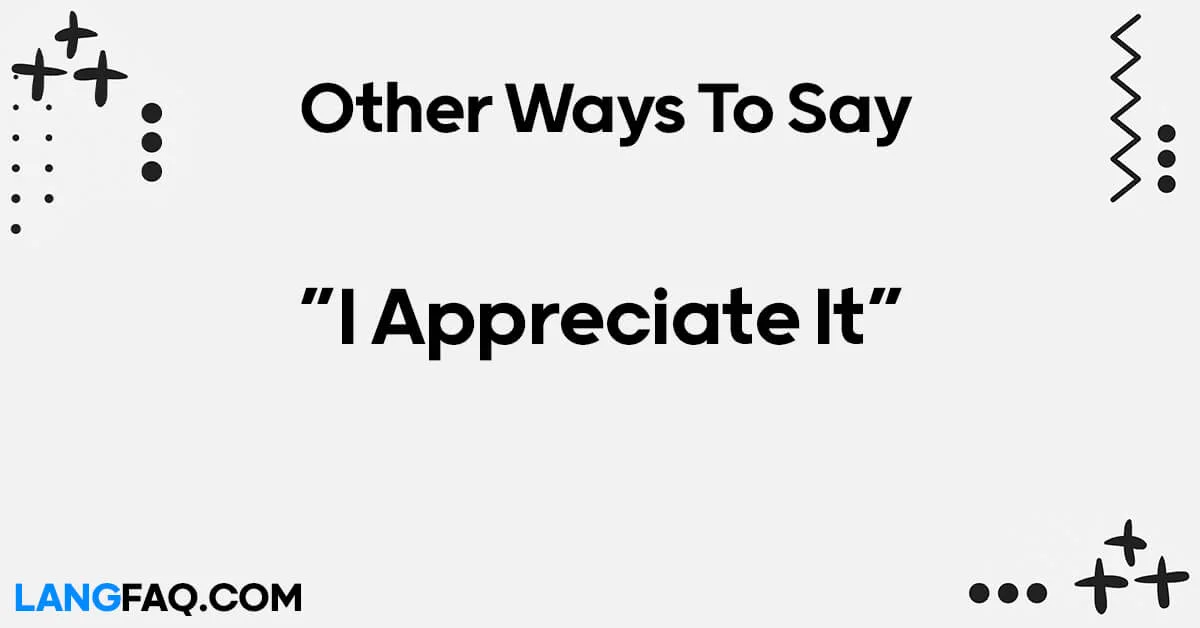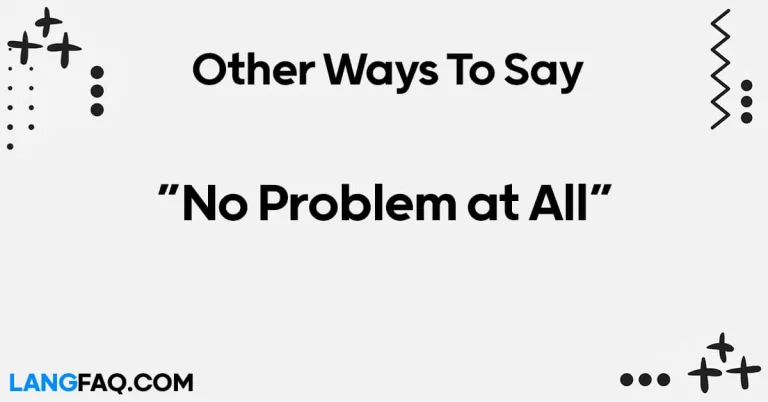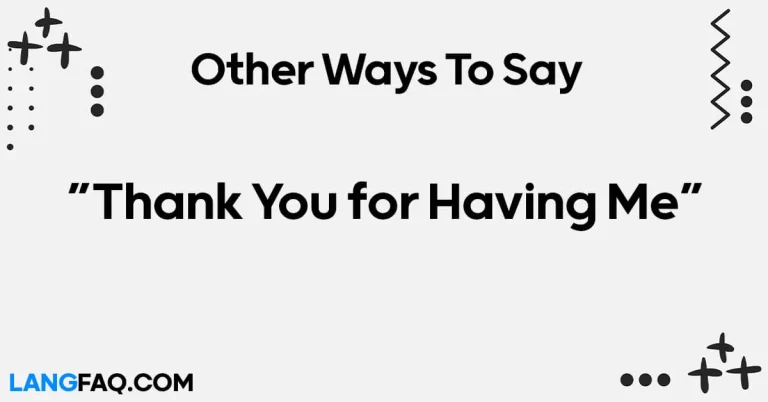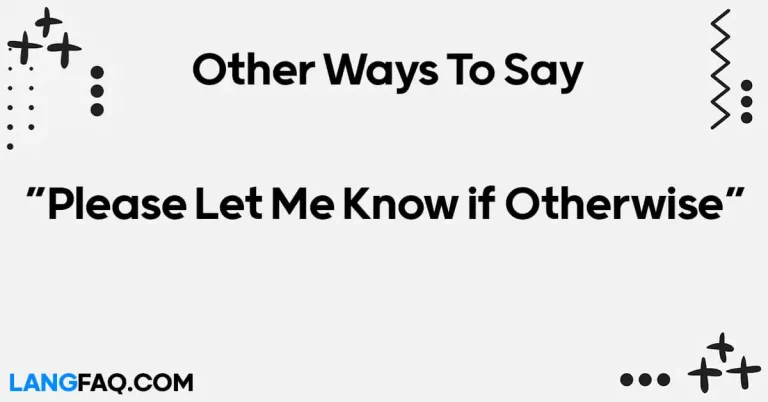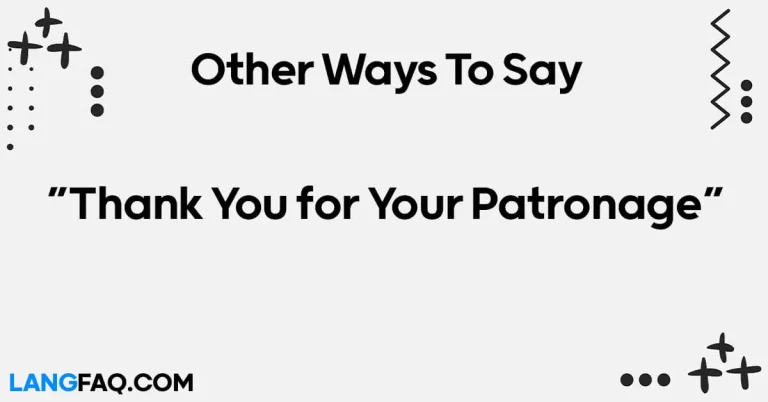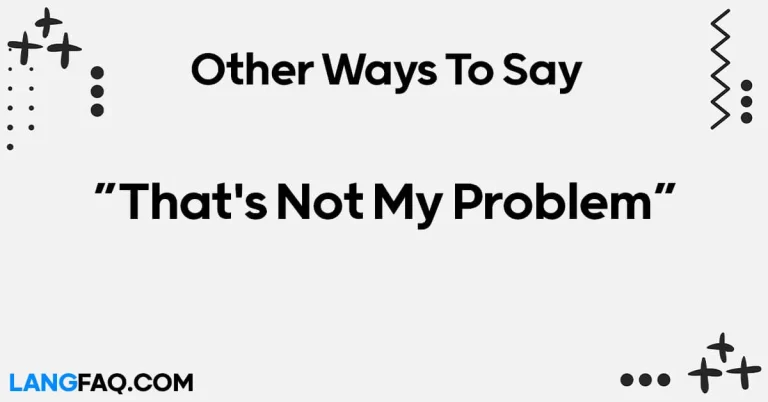Expressing gratitude is more than just saying “thank you.” It’s about conveying genuine appreciation in a meaningful way. In this guide, we’ll explore 12 fresh ways to express gratitude, offering unique alternatives to the classic phrase “I appreciate it.” Whether you’re thanking a friend, colleague, or loved one, these creative expressions will help you convey your appreciation with sincerity and warmth.
12 Other Ways to Say “I Appreciate It”
Here are 12 other ways to say “I appreciate it”:
- Thank you kindly.
- I’m grateful for your help.
- Your assistance means a lot to me.
- I’m thankful for your support.
- Much obliged.
- I deeply appreciate your kindness.
- I’m indebted to you.
- Your generosity hasn’t gone unnoticed.
- I’m thankful for your thoughtfulness.
- I’m truly appreciative of your efforts.
- I value your support immensely.
- Your help has been invaluable to me.
| Expression | Meaning | Example |
|---|---|---|
| Thank you kindly | Polite way to express gratitude | “Thank you kindly for your assistance.” |
| I’m grateful for your help | Expressing sincere appreciation | “I’m grateful for your help with the project.” |
| Your assistance means a lot | Conveying importance of help received | “Your assistance means a lot to me, thank you.” |
| I’m thankful for your support | Expressing gratitude for support | “I’m thankful for your support during tough times.” |
| Much obliged | Informal way to express thanks | “Much obliged for your help.” |
| I deeply appreciate your kindness | Conveying deep gratitude | “I deeply appreciate your kindness towards me.” |
| I’m indebted to you | Acknowledging a debt of gratitude | “I’m indebted to you for your assistance.” |
| Your generosity hasn’t gone unnoticed | Recognizing generosity | “Your generosity hasn’t gone unnoticed, thank you.” |
| I’m thankful for your thoughtfulness | Appreciating considerate actions | “I’m thankful for your thoughtfulness in remembering my birthday.” |
| I’m truly appreciative of your efforts | Expressing genuine appreciation | “I’m truly appreciative of your efforts to help me succeed.” |
| I value your support immensely | Recognizing the value of support | “I value your support immensely, thank you.” |
| Your help has been invaluable to me | Expressing the importance of help | “Your help has been invaluable to me, I couldn’t have done it without you.” |
In everyday interactions, expressing gratitude in diverse ways can strengthen relationships and foster positivity. These alternative expressions offer a variety of ways to convey appreciation, ensuring that your thanks are heartfelt and genuine.
Is It Correct to Say “I Appreciate It”?
Yes, “I appreciate it” is a correct and commonly used phrase in English. It is a polite and concise way to express gratitude or thankfulness for something that someone has done or said. It is often used in both formal and informal contexts to acknowledge kindness, assistance, or favors received from others. For example, if someone holds the door open for you, helps you with a task, or offers you a compliment, responding with “I appreciate it” is a polite way to express your gratitude.
Professional Mail Example With “I Appreciate It”
Subject: Thank You for Your Assistance
Dear [Recipient’s Name],
I hope this email finds you well. I wanted to take a moment to express my sincere gratitude for your assistance with [briefly describe the assistance or favor]. Your support and willingness to go above and beyond have been invaluable to me, and I wanted to let you know how much I appreciate it.
I understand that your time is valuable, and I’m truly grateful for the effort you put into [specific task or action]. Your expertise and dedication have made a significant difference, and I wanted to express my heartfelt thanks for your assistance.
Once again, thank you for your help. I truly appreciate it.
Best regards, [Your Name]
Thank You Kindly: Expressing Polite Gratitude
When it comes to expressing appreciation in a polite and courteous manner, “Thank you kindly” is a timeless phrase that never goes out of style. This expression is perfect for formal settings or when you want to convey your thanks with a touch of elegance.
Scenario: Imagine you’ve just received a thoughtful gift from a colleague at work. You want to express your gratitude in a polite and formal way. In this situation, saying “Thank you kindly” adds a touch of sophistication to your appreciation.
Example Sentence: “Thank you kindly for the beautiful bouquet of flowers, it truly brightened my day.”
Email Sample:
Subject: Thank You for Your Thoughtful Gesture
Dear [Colleague’s Name],
I wanted to extend my sincerest gratitude to you for the lovely bouquet of flowers you sent me. Your gesture was incredibly thoughtful and brightened my day. Thank you kindly for your kindness and generosity.
Warm regards, [Your Name]
Variations:
- “Thank you kindly for your assistance” (Formal)
- “Thanks so much for your help” (Informal)
Dictionary Insight: According to the Cambridge Dictionary, “kindly” means in a pleasant, friendly, or generous way. When used in the phrase “Thank you kindly,” it conveys appreciation with warmth and sincerity.
Pros:
- Adds a touch of elegance and sophistication to expressions of gratitude
- Suitable for formal and professional settings
Cons:
- May come across as overly formal in casual situations
- Requires a certain level of formality in tone and context
Usage Tips:
- Use “Thank you kindly” in situations where you want to express appreciation in a polite and respectful manner, such as in professional correspondence or formal settings.
- Pair it with a specific acknowledgment of the gesture or action for added sincerity.
Exceptions:
- While “Thank you kindly” is generally suitable for formal contexts, it may also be used in informal settings among individuals who prefer a more formal tone of communication.
Definition: “Thank you kindly” is an expression used to convey appreciation in a polite and courteous manner, often in formal or professional settings.
Tips:
- Use “Thank you kindly” sparingly to maintain its impact and sincerity.
- Pair it with a smile and genuine eye contact for added warmth and sincerity.
I’m Grateful for Your Help: Expressing Sincere Appreciation
Expressing gratitude with sincerity is essential in fostering meaningful connections and relationships. When you truly appreciate someone’s help, saying “I’m grateful for your help” allows you to convey your thanks in a genuine and heartfelt manner.
Scenario: Picture yourself in a situation where a friend goes out of their way to lend you a helping hand during a challenging time. You want to express your heartfelt appreciation for their support and assistance. Using the phrase “I’m grateful for your help” communicates your sincere gratitude and acknowledges the impact of their actions.
Example Sentence: “I’m truly grateful for your help in moving apartments last weekend. Your support made a daunting task much more manageable.”
Email Sample:
Subject: Heartfelt Thanks for Your Assistance
Dear [Friend’s Name],
I wanted to reach out and express my heartfelt gratitude for your invaluable help last weekend. Your willingness to lend a hand during my apartment move made all the difference, and I’m truly grateful for your support. Thank you for being such a reliable and caring friend.
Warm regards, [Your Name]
Variations:
- “I’m grateful for your support” (Formal)
- “Thanks a million for helping out” (Informal)
Dictionary Insight: According to the Cambridge Dictionary, “grateful” means feeling or showing thanks. When used in the phrase “I’m grateful for your help,” it conveys genuine appreciation and acknowledges the impact of the assistance received.
Pros:
- Conveys sincere appreciation and gratitude
- Acknowledges the specific help received, making the recipient feel valued and appreciated
Cons:
- May feel overly formal in casual settings
- Requires genuine sincerity to avoid sounding insincere
Usage Tips:
- Use “I’m grateful for your help” when you genuinely appreciate someone’s assistance and want to convey your thanks sincerely.
- Tailor your expression of gratitude to the specific help or support received for added impact and sincerity.
Exceptions:
- While “I’m grateful for your help” is suitable for various contexts, it may feel too formal in casual interactions among close friends or family members.
Definition: “I’m grateful for your help” is an expression used to convey sincere appreciation for someone’s assistance or support, acknowledging the impact of their actions on the recipient.
Tips:
- Pair your expression of gratitude with a specific example or detail to demonstrate the impact of the assistance received.
- Follow up with a gesture of appreciation, such as a handwritten note or small token of thanks, to further convey your gratitude.
Your Assistance Means a Lot: Conveying Importance with Warmth
When you want to emphasize the significance of someone’s assistance, saying “Your assistance means a lot” is a powerful way to convey gratitude with warmth and sincerity. This expression highlights the value of the help received and lets the recipient know their support is deeply appreciated.
Scenario: Imagine you’re working on a project with a colleague, and they offer valuable assistance that significantly contributes to its success. To express your gratitude and emphasize the importance of their help, saying “Your assistance means a lot” conveys the depth of your appreciation and the impact of their support.
Example Sentence: “Your assistance in preparing for the presentation means a lot to me. Your insights and expertise have been invaluable in making this project a success.”
Email Sample:
Subject: Heartfelt Thanks for Your Support
Dear [Colleague’s Name],
I wanted to take a moment to express my sincere gratitude for your assistance with the presentation preparations. Your contributions have been instrumental in ensuring the success of the project, and I want you to know how much your support means to me. Thank you for your dedication and expertise.
Warm regards, [Your Name]
Variations:
- “Your help is greatly appreciated” (Formal)
- “I can’t thank you enough for your assistance” (Informal)
Dictionary Insight: According to the Cambridge Dictionary, “means a lot” means to be very important or valuable. When used in the phrase “Your assistance means a lot,” it emphasizes the significance of the help received and conveys genuine appreciation.
Pros:
- Emphasizes the importance and value of the assistance received
- Conveys gratitude with warmth and sincerity
Cons:
- May feel overly formal in casual settings
- Requires genuine sincerity to avoid sounding insincere
Usage Tips:
- Use “Your assistance means a lot” when you want to convey the significance of someone’s help and express your gratitude sincerely.
- Tailor your expression of appreciation to the specific assistance provided to demonstrate its impact and value.
Exceptions:
- While suitable for various contexts, “Your assistance means a lot” may feel too formal in casual interactions among close friends or family members.
Definition: “Your assistance means a lot” is an expression used to convey the importance and value of someone’s help, emphasizing the impact of their support on the recipient.
Tips:
- Follow up your expression of gratitude with specific examples or details to highlight the significance of the assistance received.
- Express your appreciation sincerely and authentically to ensure your message resonates with the recipient.
I’m Thankful for Your Support: Acknowledging Gratitude with Warmth
Expressing gratitude for someone’s support is essential in nurturing relationships and fostering a sense of appreciation. When you want to acknowledge someone’s support and express your thanks sincerely, saying “I’m thankful for your support” is a heartfelt way to convey your gratitude with warmth and sincerity.
Scenario: Picture yourself in a situation where a friend has been there for you during a challenging time, offering unwavering support and encouragement. To express your heartfelt gratitude and acknowledge the impact of their support, saying “I’m thankful for your support” communicates your appreciation and gratitude with warmth and sincerity.
Example Sentence: “I’m truly thankful for your support during this difficult time. Your encouragement and kindness have been a source of strength for me.”
Email Sample:
Subject: Heartfelt Thanks for Your Support
Dear [Friend’s Name],
I wanted to reach out and express my heartfelt gratitude for your unwavering support during this challenging time. Your encouragement, kindness, and unwavering support have been a source of strength for me, and I’m truly thankful to have you in my corner. Thank you for always being there for me.
Warm regards, [Your Name]
Variations:
- “I appreciate your support” (Formal)
- “Thanks a ton for being there for me” (Informal)
Dictionary Insight: According to the Cambridge Dictionary, “thankful” means feeling or expressing gratitude. When used in the phrase “I’m thankful for your support,” it conveys genuine appreciation and acknowledges the impact of the support received.
Pros:
- Conveys gratitude with warmth and sincerity
- Acknowledges the impact of the support received
Cons:
- May feel overly formal in casual settings
- Requires genuine sincerity to avoid sounding insincere
Usage Tips:
- Use “I’m thankful for your support” when you want to express sincere gratitude for someone’s support and acknowledge the impact of their actions.
- Tailor your expression of appreciation to the specific support provided to demonstrate its significance and value.
Exceptions:
- While suitable for various contexts, “I’m thankful for your support” may feel too formal in casual interactions among close friends or family members.
Definition: “I’m thankful for your support” is an expression used to convey sincere gratitude for someone’s support, acknowledging the impact of their actions on the recipient.
Tips:
- Follow up your expression of gratitude with specific examples or details to highlight the significance of the support received.
- Express your appreciation sincerely and authentically to ensure your message resonates with the recipient.
Much Obliged: Informal Gratitude with a Touch of Charm
When it comes to expressing gratitude in a casual yet charming way, “Much obliged” is a phrase that adds a touch of elegance to your appreciation. While slightly old-fashioned, this expression conveys thanks with warmth and sincerity, making it perfect for informal settings or when you want to add a bit of flair to your gratitude.
Scenario: Imagine you’re at a small gathering with friends, and someone offers to refill your drink without hesitation. To express your thanks in a casual and charming manner, saying “Much obliged” adds a touch of elegance to your appreciation while maintaining a friendly tone.
Example Sentence: “Thanks for refilling my drink, much obliged!”
Email Sample:
Subject: Thanks a Bunch!
Hey [Friend’s Name],
Just wanted to drop you a quick note to say thanks for your help with the party last night. Your willingness to pitch in and lend a hand didn’t go unnoticed, and I wanted to let you know how much I appreciate it. Much obliged for your support!
Catch up soon, [Your Name]
Variations:
- “I’m grateful for your help” (Formal)
- “Thanks a bunch for pitching in” (Informal)
Dictionary Insight: According to the Cambridge Dictionary, “much obliged” means grateful or thankful. When used in conversation, it conveys appreciation for a favor or assistance received in a friendly and informal manner.
Pros:
- Adds a touch of charm and elegance to expressions of gratitude
- Perfect for informal settings or casual interactions
Cons:
- Slightly old-fashioned and may not be suitable for all audiences
- Requires familiarity with the phrase to avoid confusion or misinterpretation
Usage Tips:
- Use “Much obliged” in informal settings or casual conversations to express thanks with charm and warmth.
- Pair it with a smile and friendly tone to enhance its impact and sincerity.
Exceptions:
- While suitable for informal contexts, “Much obliged” may feel out of place in formal or professional settings where more traditional expressions of gratitude are preferred.
Definition: “Much obliged” is an informal expression used to convey gratitude or thanks in a friendly and charming manner, often in casual or social interactions.
Tips:
- Incorporate “Much obliged” into your vocabulary to add a touch of charm and elegance to your expressions of gratitude.
- Use it sparingly to maintain its impact and novelty in conversation.
I Deeply Appreciate Your Kindness: Expressing Profound Gratitude
When you want to convey profound gratitude for someone’s kindness, saying “I deeply appreciate your kindness” is a powerful way to express your thanks with sincerity and depth. This expression goes beyond simple words of thanks and acknowledges the genuine impact of someone’s kindness on your life.
Scenario: Imagine you’ve been going through a challenging time, and a friend goes out of their way to offer support and comfort. To express your profound gratitude for their kindness, saying “I deeply appreciate your kindness” conveys the depth of your gratitude and the significance of their actions.
Example Sentence: “I deeply appreciate your kindness in listening to me and offering support during this difficult time. Your compassion has meant more to me than words can express.”
Email Sample:
Subject: Heartfelt Thanks for Your Compassion
Dear [Friend’s Name],
I wanted to take a moment to express my heartfelt gratitude for your kindness and support during this challenging period. Your willingness to listen, offer comfort, and show compassion has touched my heart deeply, and I want you to know how much I appreciate it. I deeply appreciate your kindness, and I’m truly grateful to have you in my life.
With gratitude, [Your Name]
Variations:
- “Your kindness means the world to me” (Formal)
- “I can’t thank you enough for your compassion” (Informal)
Dictionary Insight: According to the Cambridge Dictionary, “deeply” means very or to a great degree. When used in the phrase “I deeply appreciate your kindness,” it emphasizes the profound nature of the gratitude being expressed.
Pros:
- Conveys profound gratitude and appreciation
- Acknowledges the significant impact of someone’s kindness
Cons:
- May feel overly formal in casual settings
- Requires genuine sincerity to avoid sounding insincere
Usage Tips:
- Use “I deeply appreciate your kindness” when you want to convey profound gratitude for someone’s kindness and acknowledge the impact of their actions.
- Tailor your expression of appreciation to the specific acts of kindness received for added sincerity and depth.
Exceptions:
- While suitable for various contexts, “I deeply appreciate your kindness” may feel too formal in casual interactions among close friends or family members.
Definition: “I deeply appreciate your kindness” is an expression used to convey profound gratitude for someone’s kindness, acknowledging the significant impact of their actions on the recipient.
Tips:
- Follow up your expression of gratitude with specific examples or details to highlight the profound impact of the kindness received.
- Express your appreciation sincerely and authentically to ensure your message resonates with the recipient.
Share Sincere Appreciation: Conveying Genuine Thanks
When you want to express genuine thanks for someone’s actions, saying “I want to convey my sincere appreciation” is a powerful way to communicate your gratitude with warmth and authenticity. This expression emphasizes the sincerity of your appreciation and lets the recipient know that their efforts have not gone unnoticed.
Scenario: Imagine you’ve been working on a project with a team, and a colleague goes above and beyond to ensure its success. To express your sincere appreciation for their dedication and hard work, saying “I want to convey my sincere appreciation” communicates the depth of your gratitude and the genuine value you place on their contributions.
Example Sentence: “I want to convey my sincere appreciation for your dedication and hard work on this project. Your commitment to excellence has been truly commendable, and I’m grateful to have you on our team.”
Email Sample:
Subject: Heartfelt Thanks for Your Dedication
Dear [Colleague’s Name],
I wanted to take a moment to express my sincere appreciation for your dedication and hard work on the project. Your commitment to excellence and willingness to go above and beyond have not gone unnoticed, and I’m truly grateful for your contributions. Thank you for being such a valuable member of our team.
Warm regards, [Your Name]
Variations:
- “I’m deeply grateful for your efforts” (Formal)
- “Thanks a million for your hard work” (Informal)
Dictionary Insight: According to the Cambridge Dictionary, “sincere” means genuine or without pretense. When used in the phrase “I want to convey my sincere appreciation,” it emphasizes the authenticity and genuineness of the gratitude being expressed.
Pros:
- Conveys genuine thanks and appreciation
- Emphasizes the sincerity and authenticity of the gratitude expressed
Cons:
- May feel overly formal in casual settings
- Requires genuine sincerity to avoid sounding insincere
Usage Tips:
- Use “I want to convey my sincere appreciation” when you want to express genuine thanks for someone’s actions and acknowledge the value of their contributions.
- Tailor your expression of appreciation to the specific actions or efforts for added sincerity and authenticity.
Exceptions:
- While suitable for various contexts, “I want to convey my sincere appreciation” may feel too formal in casual interactions among close friends or family members.
Definition: “I want to convey my sincere appreciation” is an expression used to convey genuine thanks and appreciation for someone’s actions, emphasizing the authenticity and genuineness of the gratitude expressed.
Tips:
- Follow up your expression of gratitude with specific examples or details to highlight the impact of the actions or efforts being appreciated.
- Express your appreciation sincerely and authentically to ensure your message resonates with the recipient.
I’m Indebted to You: Acknowledging a Debt of Gratitude
When you want to express profound gratitude for someone’s actions that have made a significant impact on your life, saying “I’m indebted to you” is a powerful way to convey your thanks with sincerity and humility. This expression goes beyond simple words of gratitude and acknowledges the depth of your appreciation for the support or assistance received.
Scenario: Imagine you’ve been facing a difficult challenge, and a friend or colleague steps in to offer crucial assistance that makes all the difference. To express your profound gratitude for their support and acknowledge the debt of gratitude you feel, saying “I’m indebted to you” communicates the depth of your appreciation and the impact of their actions on your life.
Example Sentence: “I’m truly indebted to you for your unwavering support during my time of need. Your kindness and generosity have made a world of difference, and I can’t thank you enough.”
Email Sample:
Subject: Heartfelt Thanks for Your Support
Dear [Friend’s/Colleague’s Name],
I wanted to take a moment to express my deepest gratitude for your unwavering support during [describe the situation]. Your kindness, generosity, and unwavering support have made a world of difference to me, and I’m truly indebted to you for your kindness. Thank you for being such a source of strength and support.
With heartfelt thanks, [Your Name]
Variations:
- “I owe you a debt of gratitude” (Formal)
- “I can never repay you for your kindness” (Informal)
Dictionary Insight: According to the Cambridge Dictionary, “indebted” means owing gratitude or appreciation. When used in the phrase “I’m indebted to you,” it emphasizes the depth of gratitude and acknowledges the significant impact of the support or assistance received.
Pros:
- Conveys profound gratitude and appreciation
- Acknowledges the significant impact of someone’s actions on your life
Cons:
- May feel overly formal in casual settings
- Requires genuine sincerity to avoid sounding insincere
Usage Tips:
- Use “I’m indebted to you” when you want to express profound gratitude for someone’s actions and acknowledge the significant impact of their support or assistance.
- Tailor your expression of appreciation to the specific actions or support received for added sincerity and authenticity.
Exceptions:
- While suitable for various contexts, “I’m indebted to you” may feel too formal in casual interactions among close friends or family members.
Definition: “I’m indebted to you” is an expression used to convey profound gratitude and appreciation for someone’s actions, acknowledging the significant impact of their support or assistance on your life.
Tips:
- Follow up your expression of gratitude with specific examples or details to highlight the impact of the support or assistance received.
- Express your appreciation sincerely and authentically to ensure your message resonates with the recipient.
Your Generosity Hasn’t Gone Unnoticed: Recognizing Acts of Generosity
When you want to acknowledge someone’s generosity and express your thanks in a heartfelt manner, saying “Your generosity hasn’t gone unnoticed” is a meaningful way to convey your appreciation. This expression recognizes the kindness and thoughtfulness of the giver and lets them know that their actions have made a positive impact.
Scenario: Imagine a friend or colleague goes out of their way to offer support, whether it’s lending a listening ear, providing valuable advice, or offering a helping hand. To express your gratitude for their generosity and acknowledge the positive impact of their actions, saying “Your generosity hasn’t gone unnoticed” communicates your heartfelt appreciation and gratitude.
Example Sentence: “Your generosity in offering your time and support during my job search hasn’t gone unnoticed. I truly appreciate your kindness and willingness to help.”
Email Sample:
Subject: Heartfelt Thanks for Your Generosity
Dear [Friend’s/Colleague’s Name],
I wanted to take a moment to express my heartfelt gratitude for your generosity and support during [describe the situation]. Your kindness and willingness to lend a helping hand have made a significant difference to me, and I want you to know that your generosity hasn’t gone unnoticed. Thank you for being such a caring and supportive friend/colleague.
With warmest thanks, [Your Name]
Variations:
- “I’m grateful for your generosity” (Formal)
- “Thanks a million for your kindness” (Informal)
Dictionary Insight: According to the Cambridge Dictionary, “generosity” means the quality of being kind and generous. When used in the phrase “Your generosity hasn’t gone unnoticed,” it acknowledges the kindness and thoughtfulness of the giver and expresses gratitude for their actions.
Pros:
- Recognizes acts of generosity and kindness
- Conveys heartfelt appreciation and gratitude
Cons:
- May feel overly formal in casual settings
- Requires genuine sincerity to avoid sounding insincere
Usage Tips:
- Use “Your generosity hasn’t gone unnoticed” when you want to acknowledge someone’s acts of kindness and express your heartfelt appreciation for their generosity.
- Tailor your expression of gratitude to the specific acts of generosity or support received for added sincerity and authenticity.
Exceptions:
- While suitable for various contexts, “Your generosity hasn’t gone unnoticed” may feel too formal in casual interactions among close friends or family members.
Definition: “Your generosity hasn’t gone unnoticed” is an expression used to acknowledge someone’s acts of generosity and express heartfelt appreciation for their kindness and thoughtfulness.
Tips:
- Follow up your expression of gratitude with specific examples or details to highlight the impact of the generosity or support received.
- Express your appreciation sincerely and authentically to ensure your message resonates with the recipient.
I’m Thankful for Your Thoughtfulness: Appreciating Considerate Actions
Expressing gratitude for someone’s thoughtfulness is essential in nurturing relationships and fostering a sense of appreciation. When you want to acknowledge someone’s considerate actions and express your thanks sincerely, saying “I’m thankful for your thoughtfulness” is a heartfelt way to convey your gratitude with warmth and sincerity.
Scenario: Imagine a friend remembering your birthday with a thoughtful gift or gesture, or a colleague going out of their way to offer support during a challenging time. To express your gratitude for their thoughtfulness and acknowledge the positive impact of their actions, saying “I’m thankful for your thoughtfulness” communicates your heartfelt appreciation and gratitude.
Example Sentence: “I’m truly thankful for your thoughtfulness in remembering my birthday. Your gesture meant a lot to me and brightened my day.”
Email Sample:
Subject: Heartfelt Thanks for Your Thoughtfulness
Dear [Friend’s/Colleague’s Name],
I wanted to reach out and express my sincere gratitude for your thoughtfulness in [describe the situation]. Your gesture/act of kindness meant a lot to me and made a positive impact on my day/life. I’m truly thankful for your thoughtfulness and grateful to have you in my life/as a colleague.
With warmest thanks, [Your Name]
Variations:
- “I appreciate your thoughtfulness” (Formal)
- “Thanks a bunch for thinking of me” (Informal)
Dictionary Insight: According to the Cambridge Dictionary, “thoughtfulness” means the quality of showing consideration for others. When used in the phrase “I’m thankful for your thoughtfulness,” it acknowledges someone’s considerate actions and expresses gratitude for their thoughtfulness.
Pros:
- Acknowledges considerate actions and expressions of kindness
- Conveys heartfelt appreciation and gratitude
Cons:
- May feel overly formal in casual settings
- Requires genuine sincerity to avoid sounding insincere
Usage Tips:
- Use “I’m thankful for your thoughtfulness” when you want to express sincere gratitude for someone’s considerate actions and acknowledge the positive impact of their thoughtfulness.
- Tailor your expression of gratitude to the specific acts of thoughtfulness or kindness received for added sincerity and authenticity.
Exceptions:
- While suitable for various contexts, “I’m thankful for your thoughtfulness” may feel too formal in casual interactions among close friends or family members.
Definition: “I’m thankful for your thoughtfulness” is an expression used to acknowledge someone’s considerate actions and express heartfelt appreciation and gratitude for their thoughtfulness.
Tips:
- Follow up your expression of gratitude with specific examples or details to highlight the impact of the thoughtfulness or kindness received.
- Express your appreciation sincerely and authentically to ensure your message resonates with the recipient.
It Means a Lot to Me: Expressing Deep Appreciation
When you want to convey deep appreciation for someone’s actions or words, saying “It means a lot to me” is a heartfelt way to express your gratitude and acknowledge the significance of their gesture or support. This expression communicates the depth of your appreciation and the impact of their actions on your feelings or well-being.
Scenario: Imagine a friend offering words of encouragement during a challenging time, or a colleague going above and beyond to assist you with a project. To express your deep appreciation for their support and acknowledge the positive impact of their actions, saying “It means a lot to me” conveys the sincerity of your gratitude and the significance of their gesture.
Example Sentence: “Your words of encouragement mean a lot to me during this difficult time. Thank you for always being there for me.”
Email Sample:
Subject: Heartfelt Thanks for Your Support
Dear [Friend’s/Colleague’s Name],
I wanted to take a moment to express my heartfelt gratitude for your support during [describe the situation]. Your kindness, encouragement, and unwavering support mean a lot to me, and I want you to know how much I appreciate it. Thank you for always being there for me.
With sincere thanks, [Your Name]
Variations:
- “I’m deeply grateful for your help” (Formal)
- “Thanks a ton for being so supportive” (Informal)
Dictionary Insight: According to the Cambridge Dictionary, “means a lot” means to be very important or valuable. When used in the phrase “It means a lot to me,” it emphasizes the significance of the gesture or support received and conveys genuine appreciation.
Pros:
- Conveys deep appreciation and gratitude
- Acknowledges the significance of the gesture or support received
Cons:
- May feel overly formal in casual settings
- Requires genuine sincerity to avoid sounding insincere
Usage Tips:
- Use “It means a lot to me” when you want to express deep appreciation for someone’s actions or words and acknowledge the significance of their gesture or support.
- Tailor your expression of gratitude to the specific situation or support received for added sincerity and authenticity.
Exceptions:
- While suitable for various contexts, “It means a lot to me” may feel too formal in casual interactions among close friends or family members.
Definition: “It means a lot to me” is an expression used to convey deep appreciation and gratitude for someone’s actions or words, acknowledging the significance of their gesture or support.
Tips:
- Follow up your expression of gratitude with specific examples or details to highlight the impact of the gesture or support received.
- Express your appreciation sincerely and authentically to ensure your message resonates with the recipient.
I’m Grateful for Your Help: Expressing Genuine Gratitude
When you want to express genuine gratitude for someone’s assistance or support, saying “I’m grateful for your help” is a simple yet powerful way to convey your thanks with sincerity. This expression communicates appreciation for the assistance received and acknowledges the positive impact of their actions on your life or situation.
Scenario: Imagine you’re facing a challenging task or project, and a friend or colleague offers their assistance without hesitation. To express your genuine gratitude for their help and acknowledge the difference it has made, saying “I’m grateful for your help” conveys the sincerity of your appreciation and the significance of their support.
Example Sentence: “I’m truly grateful for your help in completing the project on time. Your assistance made all the difference, and I couldn’t have done it without you.”
Email Sample:
Subject: Heartfelt Thanks for Your Assistance
Dear [Friend’s/Colleague’s Name],
I wanted to reach out and express my heartfelt gratitude for your assistance with [describe the situation]. Your willingness to lend a hand and offer your support have been invaluable to me, and I’m genuinely grateful for your help. Thank you for always being there when I need it most.
With sincere thanks, [Your Name]
Variations:
- “I appreciate your help” (Formal)
- “Thanks a million for your support” (Informal)
Dictionary Insight: According to the Cambridge Dictionary, “grateful” means feeling or showing thanks. When used in the phrase “I’m grateful for your help,” it conveys genuine appreciation for the assistance received and acknowledges the positive impact of the support.
Pros:
- Conveys genuine gratitude and appreciation
- Acknowledges the positive impact of the assistance received
Cons:
- May feel overly formal in casual settings
- Requires genuine sincerity to avoid sounding insincere
Usage Tips:
- Use “I’m grateful for your help” when you want to express genuine gratitude for someone’s assistance or support and acknowledge the positive impact of their actions.
- Tailor your expression of gratitude to the specific situation or support received for added sincerity and authenticity.
Exceptions:
- While suitable for various contexts, “I’m grateful for your help” may feel too formal in casual interactions among close friends or family members.
Definition: “I’m grateful for your help” is an expression used to convey genuine gratitude and appreciation for someone’s assistance or support, acknowledging the positive impact of their actions.
Tips:
- Follow up your expression of gratitude with specific examples or details to highlight the impact of the assistance received.
- Express your appreciation sincerely and authentically to ensure your message resonates with the recipient.
Frequently Asked Questions (FAQs)
How do I express gratitude in a heartfelt way? Expressing gratitude in a heartfelt way involves being sincere and specific in your appreciation. Instead of generic phrases, try to acknowledge the specific actions or qualities you’re thankful for.
What are some creative ways to say “thank you”? Some creative ways to say “thank you” include writing a heartfelt note, giving a thoughtful gift, or performing an act of kindness in return.
Why is it important to express gratitude? Expressing gratitude not only strengthens relationships but also has numerous benefits for mental and emotional well-being. It fosters positivity, reduces stress, and enhances overall happiness.
Can I express gratitude through actions instead of words? Absolutely! Actions speak louder than words, and gestures of kindness, support, or appreciation can convey gratitude just as effectively as verbal expressions.
How can I show appreciation in everyday life? You can show appreciation in everyday life by being attentive, saying thank you regularly, performing acts of kindness, and acknowledging others’ efforts and contributions.
Is it okay to express gratitude even for small gestures? Yes, expressing gratitude for small gestures is not only okay but also encouraged. It shows that you value and appreciate the thoughtfulness and effort, regardless of the scale.
Conclusion
Expressing gratitude is an essential aspect of fostering positive relationships and cultivating a sense of appreciation for the people in our lives. By incorporating these fresh ways to say “I appreciate it,” you can elevate your appreciation game and convey your gratitude with sincerity and warmth. Remember, a heartfelt thank you goes a long way in making others feel valued and appreciated.

